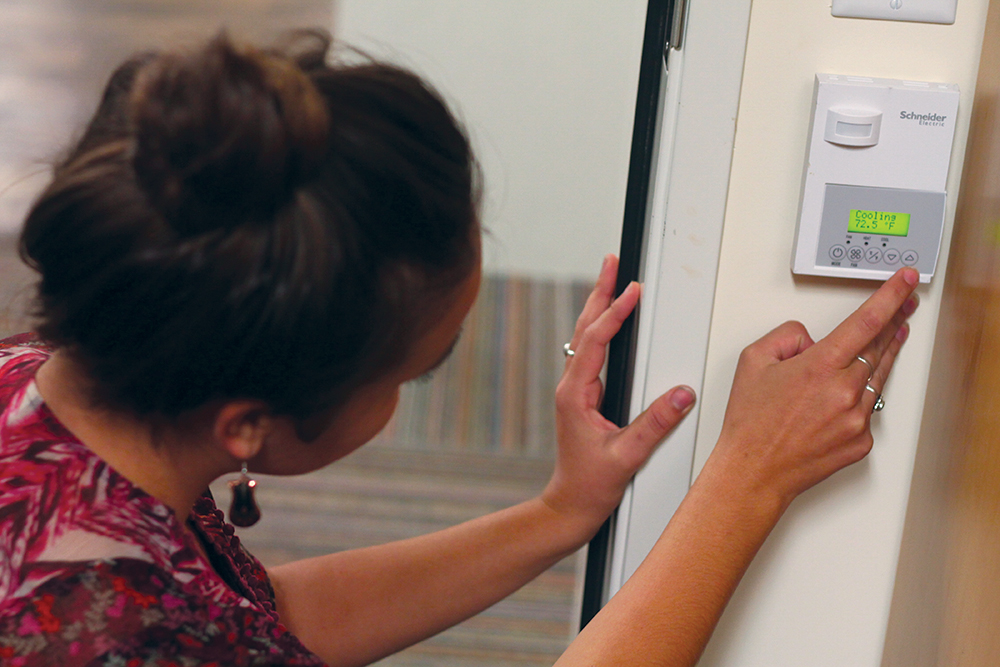Time without air conditioning as an Emerson resident advisor did not prepare junior business administration major Andy Divjak for the bizarre quality of his new dorm in Blackstone Hall — the humidity.
Divjak quickly noticed the uncomfortable moisture and seemingly high temperatures, and as getting a full night’s sleep became increasingly more difficult, Divjak decided to call in a work order to facilities management.
“They came and said they fixed it, and it seemed alright for a while,” Divjak said. “But then we started noticing things were wet.”
As weeks passed, Divjak and his roommate woke up feeling as if they were soaked in sweat and his clothes began to smell of mildew. Though the thermostat temperature readings in their room were constant, the humidity would fluctuate drastically from 66 percent to 80 percent.
The worst damage became evident when Divjak began noticing malfunctions, visible rust and a difference in the quality and performance of his guitar equipment that he kept in his room.
“The corrosive damage was getting worse on my stuff and my clothes were wet,” Divjak said. “I was just frustrated…this shouldn’t be happening, this is a brand new dorm.”
After starting direct conversations with housing services and facilities management, he was offered replacements for his $3,500 worth of damaged property and given an option of moving to a different dorm.
“They were really understanding once I brought [my issues] straight to them,” Divjak said. “It just felt like it took a long time to get to them.”
Because of his experience, housing allowed Divjak to permanently move out of Blackstone and into Hart on Oct. 23.
NOT ALONE
Of the 160 rooms in Blackstone, facilities management has received 80 work order requests concerning heating, ventilation and air conditioning since move in on Aug. 21. With each room having its own thermostat unit, the effect of the humidity problems has varied.
Senior psychology major Damaris Jaramillo lives on the fourth floor. Because she works and is not often in her dorm, she did not realize others were having similar problems.
“I thought it was only our room,” Jamarillo said. “Every time we come in there’s this scent because it’s so humid. I try to just brush it off. Open a window.”
Junior biblical and theological studies major Sasha Lopez lives on the third floor of Blackstone and has not experienced any noteworthy problems.
“I find [my room] perfect,” Lopez said. “I don’t notice the humidity in our room being a problem.”
IMPROVEMENT PROVES LESS THAN IMPRESSIVE
Each room in Blackstone Hall was outfitted with fan coil units produced by a heating, ventilation and air conditioning company called Trane. These air conditioning units have the unique feature of humidity control.
“Knowing how important humidity is to comfort levels and health we thought it would be worth trying this new technology,” said Brian Phillips, director of facilities management. “The problem is, it has not done a good job controlling humidity.”
The improper regulation of the air temperature has caused discomfort and malfunction problems experienced by some Blackstone residents.
“What’s happening is, it’s a small room, and you have air blowing. It’s blowing 55 [degrees Fahrenheit] and then 110, 55 and 110,” said Chris Reyes, manager of Biola’s central plant and HVAC. “And that’s the nuisance part.”
The specific problem, however, has yet to be identified.
“We’ve got an army of engineers, air conditioning contractors, control contractors working on the problem,” Phillips said. “As well as the air conditioning providers, we’re trying different things. But it seems like each thing we try takes several days before we eliminate one more thing as the culprit.”
One of the possible causes are the valves within the units that control the temperature of the air emitted as well as humidity levels. Biola received a report early in the semester from Trane explaining the valves installed in Blackstone were part of a defective batch.
Valve malfunction caused a hot water leak that affected several rooms. Students from two rooms were displaced for over a week and remediation work was done to allow them to return to their dorms on Nov. 6.
Facilities has been working with Trane on replacing the defective valves in each room and expects to have the problem solved before the end of the semester.







